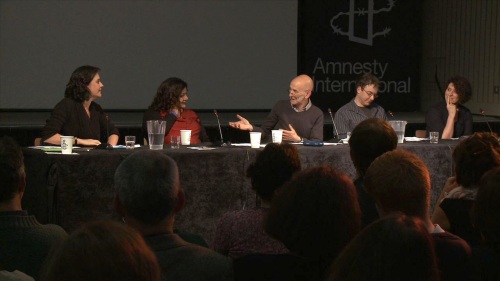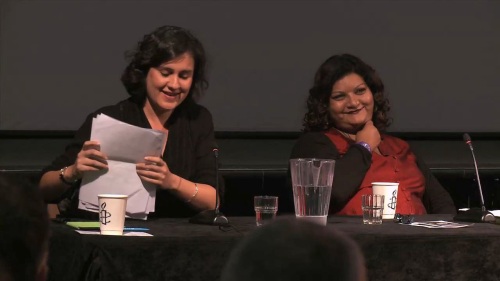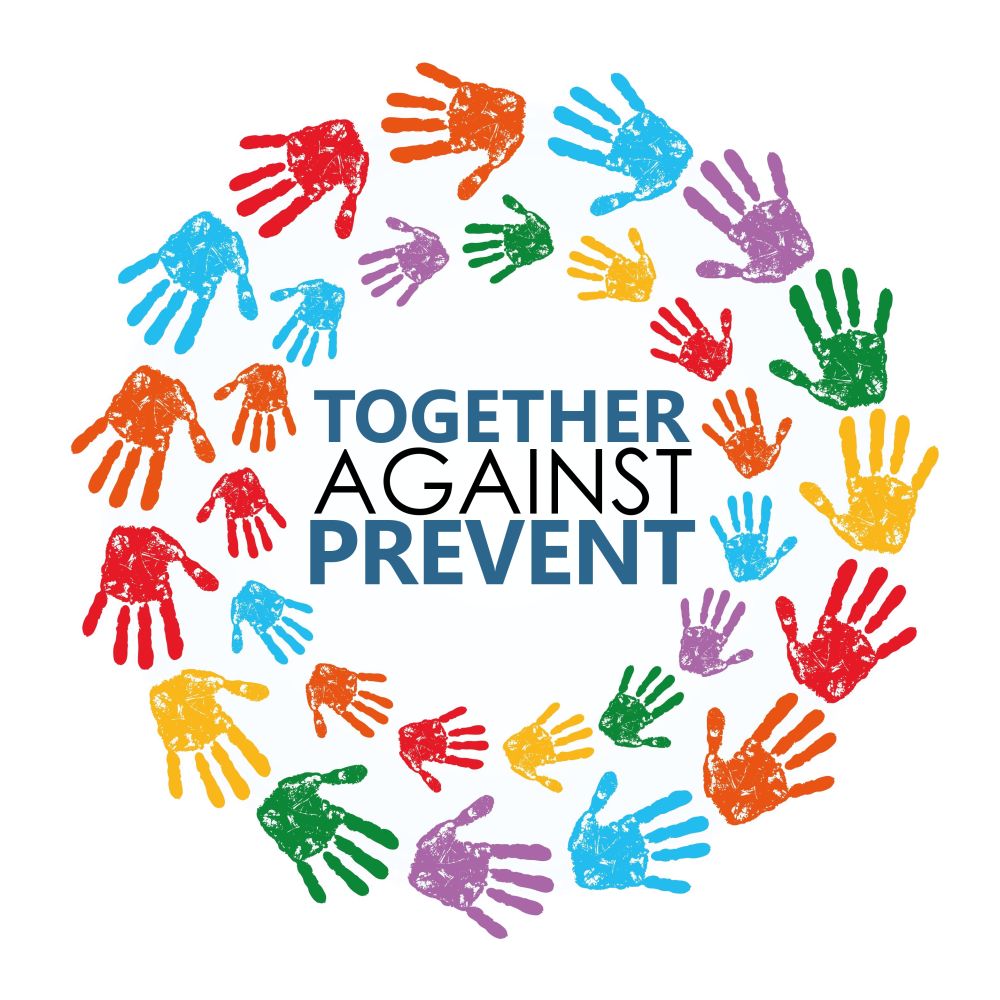
Novellist Kamila Shamsie (left) chaired a panel discussion with Tanika Gupta, Antony Lerman, Ofer Neiman and April De Angelis
A groundbreaking panel discussion at Amnesty International on October 7 proved to be a most heartening display of determination from many artists, especially theatre people, not to allow Palestine to become a no-go area as a result of threats and libellous attacks from Zionists. The whole discussion can be seen and heard here:
– The UK’s Secretary of State for Culture, Media and Sport boasts of collusion with a foreign ambassador to interfere in the governance of an independent arts institution.
– A small community theatre is pilloried as antisemitic in the national media for querying Israeli embassy funding.
– Behind-the-scenes threats bully a leading London theatre into censoring its own website.
– Sponsors of a Palestinian film festival are individually targeted with demands they withdraw support.
These were some of the instances of limits on artistic freedom exposed during a public discussion at Amnesty International’s Human Rights Action Centre on Tuesday October 7, chaired by novelist Kamila Shamsie, a former trustee of Free Word and English PEN.
With two playwrights on the panel and an audience populated by actors, writers and other artists, evidence of false charges of antisemitism being used to threaten artists and arts organisations generated anger and a determination to fight back.
“When we defend people against charges of antisemitism we should be angrier at the libellous accusations and keep the main focus where it belongs – on Israel’s racism and illegal actions,” said playwright Caryl Churchill, who was in the audience.
At the start of the meeting Shamsie read out a letter from the Department of Culture Media and Sport to a member of the public, about Culture Secretary Sajid Javid’s stance when the Tricycle Theatre in Kilburn came under sustained attack over the summer. The theatre had asked that, while Israeli forces were pounding Gaza and killing Palestinians in large numbers, the annual UK Jewish Film Festival it was due to host for the eighth time should not take funds from the Israeli Embassy. The Tricycle was subjected to pickets alleging discrimination against British Jews. Javid – a member of Conservative Friends of Israel – publicly rebuked the theatre. Artistic Director Indhu Rubasingham faced racist abuse and calls for her dismissal, even after the Tricycle board had backed down and said it would accept Israeli embassy funding in future.
The Department letter showed that far from defending the theatre’s right to choose its funding sources, Javid actively participated in harassing it – seemingly at the behest of the Israeli government.
“The Department has kept closely in touch with the Israeli Ambassador during this unfortunate chain of events,” wrote Arts and Broadcasting policy officer Dempster Marples. He said Javid would be attending the gala opening of the festival in its alternative venue “in order to demonstrate his support.”
The letter concluded, without any evident sense of irony: “The Department shall continue to challenge anti-Semitism and other forms of prejudice, and to champion freedom of cultural expression at every opportunity.”
Panellist Antony Lerman, a former Director of the Institute for Jewish Policy Research and a founding member of the Jewish Forum for Justice and Human Rights, condemned the DCMS letter for condoning false antisemitism accusations against the Tricycle Theatre.
Lerman told the meeting it was perfectly legitimate for an arts institution to choose to decline funding.
“The Tricycle’s actions showed no signs of antisemitism of any kind, nor did they represent any form of attack on freedom of expression,” he said. “And yet the official pro-Israel organisations said the Tricycle had banned a Jewish film festival. They fell back on their default position, alleging boycott and equating it with antisemitism.”
Another speaker, playwright Tanika Gupta, said she had been one of hundreds of theatrical colleagues who had rallied to support the Tricycle’s Rubasingham.
Their letter, published in the Guardian on August 15, said: ‘Punishing a small theatre for standing up for its principles is a big step backwards for anyone concerned with challenging prejudice or promoting freedom of speech. Anyone who truly wants to stand against antisemitism needs to stand with the Tricycle theatre and challenge those who are accusing it in a disproportionate, unjust and ill-informed way.’
“Antisemitism, Islamaphobia and other forms of race prejudice are on the rise,” said Gupta. “Labelling the Tricycle antisemitic bleeds significance from the term.”
This position was well-understood by many leading theatrical figures who expressed their support for the Tricycle behind the scenes. “In future they need to act faster and in public,” said Gupta. “We need to get organised!”
The meeting also heard from writer Rachel Holmes, former head of literature at the South Bank. In a message read out by Shamsie, Holmes explained her disappointment at the decision of the Donmar Warehouse to censor a podcast of an event she programmed concerning Britain and the Middle East at the Donmar in March and April of this year.
To accompany Peter Gill’s production of his play Versailles, the Donmar presented a series of events with leading political and cultural commentators exploring the legacy of World War I.
Podcasts were to be available on the Warehouse website. However there is no podcast corresponding to the last of the five, Mr Balfour’s Letter to Lord Rothschild: How the Great War Remapped the World.
“On 1st April,” said Holmes, “24 hours prior to the discussion taking place, the Donmar Warehouse received its first complaint from a funder claiming that the event was an attack on the state of Israel, an ‘anti-Israel rally’ and antisemitic.”
This was accompanied by threats to withdraw funds and to raise grievances with public funders, including publically funded cultural institutions in which Holmes works and/or sits on the boards. The intimidation worked. Donmar did not post the offending podcast.
Another example was described by audience member Bill McAllister, former Director of the Institute of Contemporary Arts. He said that during his tenure (1977–1990), the ICA was directly threatened with blacklisting by the Board of Deputies of British Jews for hosting the first UK Palestinian Film Festival. The BoD attempted to implement its threat by writing to every sponsor demanding that they should pull out. Attempts at face-to-face discussion collapsed with the BoD spokesman “flying into a rage,” McAlister said. In this instance the ICA stood firm. But the audience at the panel discussion was left wondering how many more cases of successful bullying and intimidation there have been over the years.
Judith Knight of ArtsAdmin said that institutions should develop clear ethical funding policies and make them public. “Yes, it may mean that we have to cope with less money, but we are less likely to be caught out if we make decisions that enrage powerful interests.”
Equity activist Doug Holton said the question of Zionist interference in the arts must not be “a no-go area” within democratic structures such as unions and guilds representing cultural professionals.
“We need to be ready to confront Zionist racists calling us racists,” Holton said. “Without politics art is mere entertainment. We must defend the arts against political manipulation.”
Les Levidow, of Jews for Boycotting Israeli Goods, supported calls for artists to organise against Zionist bullying.
“Throw back the accusation of anti-Semitism as the racist stereotype it is. Do not buy into the lie that all Jews are bound to the State of Israel,” he said.
Jonathan Rosenhead, chair of the British Committee for the Universities of Palestine was encouraged by the way theatres came together in defence of the Tricycle theatre. “Soon people will have to explain why they are NOT boycotting,” said Rosenhead.
Poet Seni Seneviratne argued passionately for artists to try to make a difference in a situation of injustice. “I will take a moral decision on any invitation from an oppressive regime, and in the case of Palestine I’m supporting a boycott call from within, from Palestinians themselves,” she said. “Not to boycott would be crossing a picket line and I am not a scab!”
Dramatist April De Angelis, another member of the panel, pointed out that there were several current and historical instances of boycotts challenging dubious sponsorship of the arts – a process she called “culture-washing”.
She pointed to the stand taken by the Writers Guild of the UK and Actors’ Equity in supporting the boycott campaign targeting Apartheid South Africa in the 1970s and beyond, and noted that today, the Art not Oil coalition “campaigns against sponsorship by criminally negligent corporations.”
Having worked with young Palestinians in play-writing workshops De Angelis had decided to reject Israeli “culture-washing” and join the cultural boycott. “Those kids would not have had access to my work if performed in Israel,” she told the meeting.
The final member of the panel, Ofer Neiman, an active member of the Israeli group Boycott from Within, explained culture-washing in more detail.
He quoted a special department in the Israeli Ministry of Foreign Affairs describing its own responsibilities as “attaining prominence and high exposure abroad for Israel’s cultural and scientific activity, as an important tool for the promotion of its political interests.”
The term Hasbara (“explaining” in Hebrew) is frequently used to describe the way presenting positive messages about Israel serves to “drown out the growing criticism of its appalling human rights violations,” said Neiman.
He cited Nissim Ben-Shitrit, former deputy director general at the foreign affairs ministry: “We regard culture as a hasbara tool of the highest order, and I do not differentiate between hasbara and culture”.
Efforts to bring about change in the actions of the Israeli government need to be based on the understanding that culture cannot be separated from politics.
Neiman said Israeli dissidents were too few to bring about change by themselves, from within.
“Artists, in the UK and elsewhere, can play an important role in the collective effort to stop the Israeli regime’s crimes, simply by saying no to the use of culture for Israeli state propaganda. Those who do so may face smearing and bullying, but they will find supporters all over the world, including Israeli citizens who will stand with them.”
- The International Jewish Anti-Zionist Network (IJAN), which first drew the Tricycle Theatre’s attention to the Israeli Embassy funding of the UK Jewish Film Festival in 2013, has set up an initiative under the rubric No Israeli Funding for the Arts. It is calling on all of the venues hosting the film festival following its rift with the Tricycle theatre to pull out of the screenings because of the Embassy link.
- Full details follow.
| NO ISRAELI FUNDING OF THE ARTS
IJAN is centrally involved in the No Israeli Funding of the Arts initiative – we want everyone we are in touch with to know that the Israeli-funded UKJFF (UK Jewish Film Festival) is taking place this year (6-23 November) in cinemas in Glasgow, Leeds, London, Manchester and Nottingham. We have written to all the cinemas – see our letter below – and we are asking that you contact your local (or even a distant) cinema by phone, email, website, leaflet or street protest, and let them know what you think of them hosting an Israeli-funded event. (All cinema contact details are at end of this email.) Call or write to the local press or call-in radio to tell them what you think of their not caring for the Jewish films, only for the Israeli rebranding (see below). Check the UKJFF calendar to find when each cinema is hosting UKJFF films. The opening gala night is at the London BFI on 6 November – we are planning to protest their collaboration with the slaughterers of the Gazan people. Note: IJAN workshop, From Gaza to Ferguson @ Anarchist Bookfair, 18 Oct, 3-4pm |
| NO ISRAELI FUNDING OF THE ARTS
LETTER TO CINEMAS HOSTING THE UK JEWISH FILM FESTIVAL We are writing to you as one of the cinemas hosting the UK Jewish Film Festival (UKJFF) 6-23 November, 2014, to ask that you reconsider.
Who we are
Tricycle / UKJFF The Tricycle had offered the organisers of the UKJFF replacement funding so that the film festival could go ahead at the Tricycle. But the UKJFF refused their offer and to dissociate itself from the Israeli government – the priority was Israeli sponsorship, rather than the film festival. Is the UKJFF merely a means to a political end, to give Israel a humanist image?
Who attacked the Tricycle
Who defended the Tricycle
In July, Scottish artists, including National Poet Liz Lochhead, signed an open letter in The Herald protesting an Israeli-funded theatre company at the Edinburgh Fringe. After vociferous public protest, the show closed after one performance.
Following the Tricycle’s refusal of Israeli funding, the Encounters Film Festival in Bristol and artists from the 31st Sao Paulo Art Biennial in Brazil also refused Israeli funding.
What Israel’s apologists did
The Russell Tribunal on Palestine found evidence of war crimes, crimes against humanity, crimes of murder, extermination and persecution and also incitement to genocide.
What happened to the Tricycle
That stand reaffirmed that the arts are social and political. It was welcomed by anti-racists everywhere. And please note: both the local council and the Arts Council ruled out loss of funding.
What we want you to do
Who knows better than Archbishop Desmond Tutu, a proponent of cultural boycott, who said, “We in South Africa know about oppression and occupation and know about the power of BDS” (Boycott, Divestment & Sanctions)?
We ask that you take direction from the anti-racist, non-violent, Palestinian-led BDS movement.
We ask that you refuse to host the UKJFF – not because it is Jewish, of course, but because it is funded by the Israeli Embassy. The embassy’s job, especially in London (the boycott “hub”) is to promote what it calls Brand Israel – state-sponsored propaganda, designed to camouflage Israeli brutality within a smokescreen of culture, including film festivals.
We ask that you side with the victims and survivors of the assault on Gaza – not be part of the cover-up of war crimes being committed against them. |
|
CINEMAS HOSTING THE UKJFF Glasgow Venue CCA (Centre for Contemporary Arts) Address 350 Sauchiehall St, Glasgow G2 3JD Email gen@cca-glasgow.com Telephone 0141 352 4900
Venue Glasgow Film Theatre Address 12 Rose St, Glasgow, Lanarkshire G3 6RB Email jaki.mcdougall@glasgowfilm.org (Chief Executive) Telephone 0141 332 6535 Leeds Venue MAZCC Address 311 Stonegate Road, Leeds LS17 6AZ Email: enquiries@ljwb.co.uk Telephone 0113 268 4211
Venue Seven Arts Centre Address 31(a) Harrogate Road, Chapel Allerton, Leeds, LS7 3PD Email info@sevenleeds.co.uk Telephone 0113 26 26 777
London Venue Arthouse Crouch End Address: 159A Tottenham Lane, N8 9BT Email info@arthousecrouchend.co.uk Contact form http://www.arthousecrouchend.co.uk/contact/ Telephone 020 8245 3099
Venue BAFTA British Academy of Film and Television Arts Address 195 Piccadilly, W1J 9LN Email info@bafta.org Contact form http://www.bafta.org/contact-us.html Telephone 020 7734 0022
Venue Barbican Address Barbican Centre, Silk Street, EC2Y 8DS Email film@barbican.org.uk Feedback https://www.barbican.org.uk/general/online-feedback-form.asp Telephone 020 7638 4141
Venue BFI Southbank Address Belvedere Road, South Bank, SE1 8XT Email director@bfi.org.uk Contact form http://www.bfi.org.uk/form/contact-bfi-southbank Telephone 020 7255 1444
Venue Ciné Lumière Address 17 Queensberry Place, SW7 2DT Email box.office@institutfrancais.org.uk Telephone 020 7871 3515
Venue Curzon Mayfair Address 38 Curzon Street, W1J 7TY Email manager.mayfair@curzon.com Contact form http://www.curzoncinemas.com/contact_us/
Venue Odeon Muswell Hill Address Fortis Green Road, N10 3HP Contact form http://www.odeon.co.uk/contactus/ Telephone 0207 321 6237 (conferencing & events)
Venue Everyman Maida Vale Address 215 Sutherland Avenue, W9 1RU Email maidavale.manager@everymancinema.com Contact form http://www.everymancinema.com/contact-us/ Telephone 0871 906 9060
Venue Everyman Hampstead Address 5 Holly Bush Vale, NW3 6TX Email hampstead.manager@everymancinema.com Contact form http://www.everymancinema.com/contact-us/ Telephone 0871 906 9060
Venue JW3 Address 341-351 Finchley Road, London NW3 6ET Email info@jw3.org.uk Telephone 020 7433 8988
Venue LJCC (London Jewish Cultural Centre) Address Ivy House, 94-96 North End Road, NW11 7SX Email admin@ljcc.org.uk Contact form http://www.ljcc.org.uk/contact/ Telephone 020 8457 5000
Venue Odeon South Woodford Address 60/64 High Road, South Woodford, E18 2QL Contact form http://www.odeon.co.uk/contactus/ Telephone 0207 321 6237 (conferencing & events)
Venue Odeon Swiss Cottage Address 96 Finchley Rd, NW3 5EL Contact form http://www.odeon.co.uk/contactus/ Telephone 0207 321 6237 (conferencing & events)
Venue Phoenix Cinema Address 52 High Road, East Finchley, N2 9PJ Email management@phoenixcinema.co.uk Telephone 020 8444 6789
Manchester Venue Cornerhouse Address 70 Oxford St, Manchester M1 5NH Email info@cornerhouse.org Telephone 0161 228 7621
Venue Cineworld Didsbury Address Parrs Wood Entertainment Centre, Wilmslow Rd, Manchester M20 5PG Contact form https://www.cineworld.co.uk/contact (250 words max.) Telephone 0208 742 4010
Venue Menorah Address 198 Altrincham Rd, Wythenshawe, Manchester M22 4RZ Email filmclub@menorah.org.uk Contact form https://menorah.org.uk/contact-us/ Telephone 0161 428 7746
Nottingham Venue Broadway Cinema Address 14–18 Broad St, Nottingham NG1 3AL Email info@broadway.org.uk Contact form http://www.broadway.org.uk/contact/steve (Chief Executive) Telephone 0115 9526 611
|


